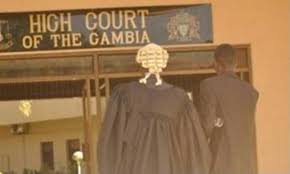By Dawda Faye
Alagie Jabang, former finance director at Gam Petroleum, earlier today before the Janneh Commission stayed that he would not discuss the reasons of his termination as finance director of the said company because it was not the right forum.

Surahata Janneh
He reappeared for continuation of cross-examination by Messer Bazzi and Mazegi’s attorney, Victoria Andrews.
Ms. Andrews reminded him about the account for reconciliation which he carried out with Euro Africa Group. She told him that the reconciliation followed the meeting held between Gam Petroleum and Euro Africa Group, and he denied it.
He said it was done during the audit; adding that he attended a meeting with Mr. Bazzi and Saihou Drammeh but could not remember vividly what happened during the meeting, noting that Mr. Bazzi wanted them to strike a deal and he told him to correct their records, such as the exchange rate. However, he testified that Mr. Mazegi threatened to institute a legal action against the company which he said would incur more than what they were claiming.
The former finance director adduced that he could recollect that a document was signed by Messer Mazegi and Drammeh.
At this juncture, he was given the document which was later given back to Counsel Andrews who read the contents to the witness. She put it to him that a sum of $47,000 was supposed to be waived by Eagle Company.
Again, Ms. Andrews gave him the said document to identify the signature on it. In response, he said the signature looked like Saihou Drammeh’s.
On the signatories of Gam Petroleum account, he told the commission that they were Mr. Michael Gladie, former general manager, himself and Mr. Momodou Badjie, former managing director of Gambia National Petroleum Corporation.
He revealed that when Michael left, he and Saihou Drammeh became signatories to the account and that the former GM together with one Simon Paul signed the cheque issued to APRC.
It was put to him by Counsel Andrews that they made a payment of D2.7 million but he said from the D5,000,000, they made a payment of D3.7 million to APRC, noting that the payment to the former ruling party was from the 2016-2017 budget. He said prior to that, there was a board meeting but he was not privy to know what led to the dismissal of the general manager.
It was again put to him that the minutes of meeting indicated that there were no donations made to the APRC but Mr. Jabang insisted that he could recall at a board meeting that they should give something to the ‘big man.’
“What you have said is not the truth,” Counsel Andrews challenged him, but he said he said truth. With regard to the payments made to the APRC, he said he made the GM to sign a document; hence he was talking to him verbally. “I was terminated after a disciplinary hearing,” he revealed.
Ms. Andrews put it to him that he failed to tell the auditors that the sum of €2.9 million was owed to
Euro Africa Group by Gam Petroleum. However, Mr. Jabang was a bit skeptical to respond to the question but was quick to argue that he was not the subject matter before the commission.
According to Jabang, the commission was not the platform to discuss issues that triggered his termination as finance director at Gam Petroleum.
Next to testify was Mr. Karamba Touray, auditor general at the National Audit Office, appeared before the Janneh Commission in connection to an audit carried out on the “Daily Observer” newspaper company.
According to him, the audit on “Daily Observer” came as a request from the office of the former president through a letter dated 4th June, 2015. He confirmed that the audit was conducted and he was in possession of the file and the audit report as well.
At this juncture, a copy of the file from the National Audit Office (NAO), including a letter of engagement between the company and the National Audit Office were tendered and admitted as exhibit.
Mr. Touray testified that they were tasked to audit the company from July 2010-31st July, 2015, noting that they were able to establish the original owners of the company but then it was not registered.
According to Mr. Touray, among their main findings were the inability to establish the ownership of the company because it was not registered before it was sold, but the original owners were Keneth Y. Bett and Lawyer Ida Drammeh. He said tax liabilities and social corporate responsibilities and staff loans were not paid; adding that they also discovered that some payments could not be justified, as they were not supported by documents.
At this juncture, Commissioner Saine told him that as national audit, they are allowed to audit public institutions and not private firms. However, Touray responded that where the government has minor interest, they would conduct an audit.
He told the commission that they could not establish who purchased the company from the original owners, noting that appointment of staff usually came from the office of the former president. He stated further that the company should be sold in a public auction, further stating that he did not consider the company to be a public enterprise.
On how they came to know that the “Daily Observer” was not registered, he said they consulted the AG Chambers and were told that the company was not registered.
Mr. Baba Fatajo, managing director of NAWEC, reappeared for cross-examination at the instance of Messer Bazzi and Fadi Mazegi of Euro Africa Group.
Ms. Andrews told him that he was required to produce some documents.
However, he responded that the volume of documents they asked for could not be put together, noting that he is on leave.
At this juncture, Mrs. Bensouda intervened and told the commission that the Legal Officer at NAWEC wrote, indicating that it would take time to produce the said documents requested by Counsel Andrews ranging from 2002-2015.
Testifying under cross-examination, he said he started work at NAWEC in 1993 up to 2013 when his services were terminated but was reinstated in March, 2017.
Commission Counsel, Amie Bensouda, submitted that the request made by Bazzi’s attorney was unfair because it was not specific as to which documents she needed.
According to her, Ms. Andrews ought to be precise on the documents she wanted to be produced; adding that from 2002-2015 is a long period. She said it would just waste the time of the commission.
On the other hand, Ms. Andrews argued that her request was apt and did not in any way intend to waste the time of the commission. She added that NAWEC witnesses, including Alagie Conteh, alleged that contracts were not awarded properly. She said the only way they could contradict such allegations was by providing them with the necessary documents.
She explained to the commission that the request was made on 18thof July and forwarded to NAWEC
on the 19th of the same month, 2018. She revealed that their request was on electricity and water projects.
At this juncture, commission’s chairman, Sourahata Janneh, said: “It is our desire to be as fair as possible.” However, he said from 2002-2015 is extremely wide, despite the fact that Counsel Andrews was limiting her request to electricity and water projects respectively.
He finally ruled that production of documents by NAWEC must be based on relevance.
Sittings continues.


Ma sha Allah great and thanks for sharing